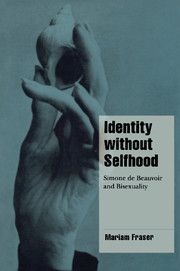Introduction
Published online by Cambridge University Press: 27 October 2009
Summary
[W]e demand that sex speak the truth … and we demand that it tell us our truth, or rather, the deeply buried truth of that truth about ourselves which we think we possess in our immediate consciousness.
Michel Foucault, The History of Sexuality, Volume IIn The History of Sexuality, Volume I, Foucault suggests that the acquisition of sexual identity is closely bound up with the acquisition of selfhood. In the modern era, sexuality is perceived to lie at the heart of the self, such that to ‘come to terms’ with the truth of sexuality is to come to terms with the truth of the self. In this respect, identity and selfhood are conjoined.
It is with the almost inextricable relation between identity and selfhood that this book is concerned. The sexual identity in question here is bisexuality, the self that of Simone de Beauvoir. A proliferation of newspaper, academic and biographical representations all comment on, and in that commentary are constitutive of, a self which is attributed to de Beauvoir, such that it is perceived to be her property and her responsibility. Significantly however, while de Beauvoir, as I will show, is differently constituted in each of the three fields of cultural production, the representation of bisexuality remains, for the most part, consistent: it is inchoately produced across all three ‘genres’. This suggests that the discursive possibilities of bisexuality are either limited or enabled by the very same techniques and practices which produce de Beauvoir as an intelligible and coherent self. I will argue that it is the multitude of techniques by which de Beauvoir is produced as an individual that simultaneously serve to erase bisexuality, again and again, as an identity which pertains to the self.
Information
- Type
- Chapter
- Information
- Identity without SelfhoodSimone de Beauvoir and Bisexuality, pp. 1 - 3Publisher: Cambridge University PressPrint publication year: 1999
Accessibility standard: Unknown
- 1
- Cited by
